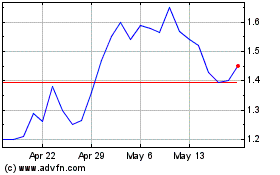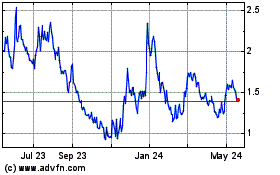New Nature Medicine Publication Shows ctDNA Levels Linked to Recurrence Risk in Lung Cancer
January 13 2025 - 4:00AM
Business Wire
Results demonstrate the importance of
ultra-sensitive ctDNA detection in lung cancer
Personalis, Inc. (Nasdaq: PSNL), in collaboration with Professor
Charles Swanton and his colleagues at London’s Francis Crick
Institute and University College London, published new results from
their TRACERx lung cancer study in Nature Medicine. In this
groundbreaking study funded by Cancer Research UK, co-authors Black
and Bartha et al. highlight advancements in lung cancer detection
using NeXT Personal®, an ultra-sensitive personalized test designed
to detect small traces of circulating tumor DNA (ctDNA) in the
blood of cancer patients and survivors.
In this study, NeXT Personal was used to analyze pre-operative
blood samples from a TRACERx cohort of 171 patients with
early-stage non-small cell lung cancer (NSCLC). The NeXT Personal
test showed high sensitivity for detecting early-stage I-III NSCLC
pre-operatively, including 100% of non-adenocarcinomas and 81% of
lung adenocarcinomas (LUAD), a common subtype that has previously
been one of the most challenging to detect in blood samples because
of low ctDNA shedding.
The publication also showed ctDNA levels prior to surgery were
highly prognostic for overall survival in early-stage LUAD
patients. Early-stage LUAD patients who tested negative for ctDNA
with NeXT Personal prior to surgery exhibited a 100% 5-year overall
survival rate while patients testing positive had a high overall
risk of relapse during that same period. Furthermore, patients who
tested positive for very low traces of cancer (below 80 PPM of
ctDNA) still had a high risk of recurrence, suggesting the
importance of ultra-sensitive MRD testing with NeXT Personal. “This
study demonstrates the potential of using more sensitive ctDNA
tests like NeXT Personal in detecting lung cancer. These tools are
important for personalizing care and maximizing the clinical
benefit for individual patients,” said Dr. Charles Swanton.
"We designed NeXT Personal to detect residual or recurrent
cancer in its earliest stages, and this study shows the clinical
importance of that ultra-sensitive detection in early-stage lung
cancer,” said Richard Chen, MD, MS, Chief Medical Officer and
Executive Vice President of R&D at Personalis. “We look forward
to continuing our work with the TRACERx team on the broader
clinical performance of ctDNA testing in early stage lung cancer.
We expect the subsequent publication of those results will help
support our submission for Medicare coverage of NeXT Personal Dx in
lung cancer.”
Personalis’ NeXT Personal assay utilizes whole-genome sequencing
of the patient’s tumor to identify a unique signature of up to
~1,800 variants. A personalized blood test is then created for the
patient that can recognize that signature with an ultra-high
sensitivity down to ~1 PPM of ctDNA. The findings of this study
suggest the potential for using NeXT Personal in guiding management
of lung cancer, the second most common cancer in the U.S., with an
estimated 238,340 new cases and 127,070 deaths in 2023, and high
recurrence rates even in early-stage disease.
About Personalis, Inc.
At Personalis, we are transforming the active management of
cancer through breakthrough personalized testing. We aim to drive a
new paradigm for cancer management, guiding care from biopsy
through the life of the patient. Our highly sensitive assays
combine tumor-and-normal profiling with proprietary algorithms to
deliver advanced insights even as cancer evolves over time. Our
products are designed to detect minimal residual disease (MRD) and
recurrence at the earliest timepoints, enable selection of targeted
therapies based on ultra-comprehensive genomic profiling, and
enhance biomarker strategy for drug development. Personalis is
based in Fremont, California. To learn more, visit
www.personalis.com and connect with us on LinkedIn and X
(Twitter).
About The Francis Crick Institute
The Francis Crick Institute is a biomedical discovery institute
dedicated to understanding the fundamental biology underlying
health and disease. Its work is helping to understand why disease
develops and to translate discoveries into new ways to prevent,
diagnose and treat illnesses such as cancer, heart disease, stroke,
infections, and neurodegenerative diseases.
An independent organisation, its founding partners are the
Medical Research Council (MRC), Cancer Research UK, Wellcome, UCL
(University College London), Imperial College London and King’s
College London.
The Crick was formed in 2015, and in 2016 it moved into a brand
new state-of-the-art building in central London which brings
together 1500 scientists and support staff working collaboratively
across disciplines, making it the biggest biomedical research
facility under a single roof in Europe.
http://crick.ac.uk/
Forward-Looking Statements
This press release contains forward-looking statements within
the meaning of the Private Securities Litigation Reform Act of
1995. All statements in this press release that are not historical
are “forward-looking statements” within the meaning of U.S.
securities laws, including statements relating to the attributes,
advantages, sensitivity or clinical relevance of the NeXT Personal
test. Such forward-looking statements involve known and unknown
risks and uncertainties and other factors that may cause actual
results to differ materially from any anticipated results or
expectations expressed or implied by such statements, including the
risks, uncertainties and other factors that relate to the ability
of NeXT Personal to detect small traces of ctDNA, detect residual
or recurrent cancer early, monitor a patient’s response to therapy
or more accurately predict clinical outcomes for cancer patients,
or to the clinical adoption or use of, or the ability of Personalis
to submit for or obtain Medicare coverage or reimbursement for, the
NeXT Personal test. These and other potential risks and
uncertainties that could cause actual results to differ materially
from the results predicted in these forward-looking statements are
described under the captions “Risk Factors” and “Management’s
Discussion and Analysis of Financial Condition and Results of
Operations” in Personalis’ Annual Report on Form 10-K for the year
ended December 31, 2023, filed with the Securities and Exchange
Commission (SEC) on February 28, 2024, as updated by Personalis’
Quarterly Report on Form 10-Q for the quarter ended March 31, 2024,
filed with the SEC on May 8, 2024, Quarterly Report on Form 10-Q
for the quarter ended June 30, 2024, filed with the SEC on August
7, 2024, and Quarterly Report on Form 10-Q for the quarter ended
September 30, 2024, filed with the SEC on November 6, 2024. All
information provided in this release is as of the date of this
press release, and any forward-looking statements contained herein
are based on assumptions that we believe to be reasonable as of
this date. Undue reliance should not be placed on the
forward-looking statements in this press release, which are based
on information available to us on the date hereof. Personalis
undertakes no duty to update this information unless required by
law.
View source
version on businesswire.com: https://www.businesswire.com/news/home/20250113074971/en/
Investors: Caroline Corner investors@personalis.com
415-202-5678
Media Contact pr@personalis.com
Personalis (NASDAQ:PSNL)
Historical Stock Chart
From Dec 2024 to Jan 2025

Personalis (NASDAQ:PSNL)
Historical Stock Chart
From Jan 2024 to Jan 2025
